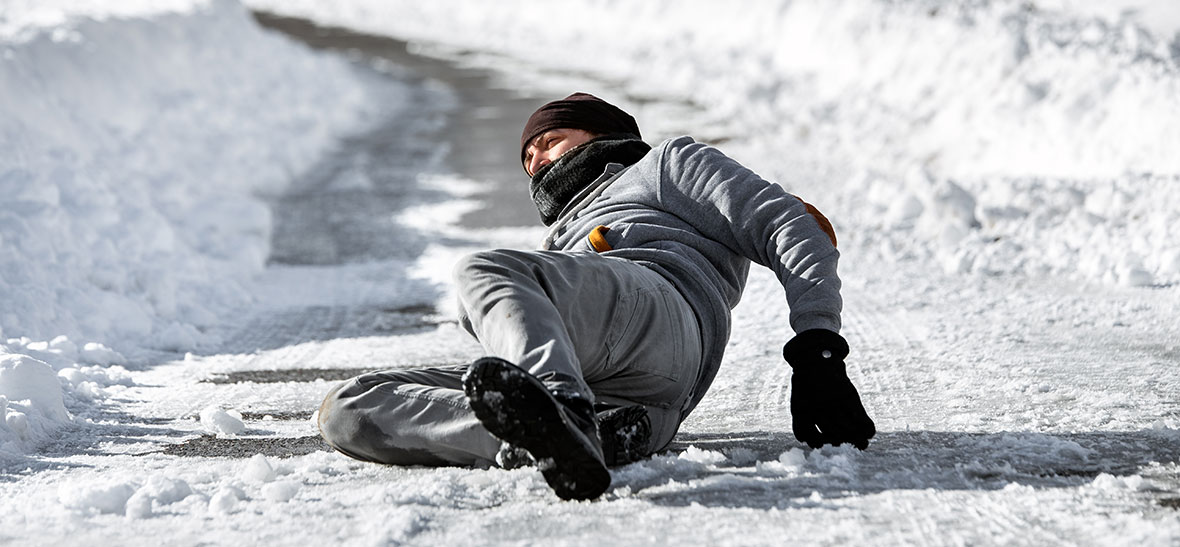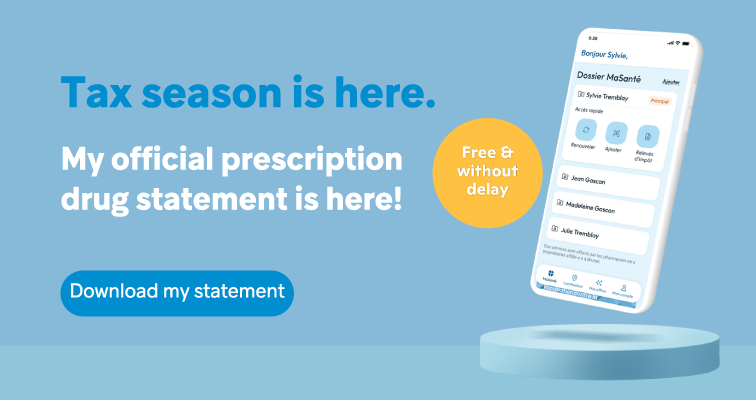Snowstorms, freezing rain, strong winds, extreme cold . . . Winter weather comes with unique health risks. Are you ready for it? Here are some tips and tricks to help you prepare.

The risks of snowstorms
Whether a snowstorm is accompanied by freezing rain or not, it can cause all kinds of headaches—not to mention potential health and safety risks! Here are some of the main risks to consider.
- Food poisoning
Snowstorms can cause power outages. In the event of a prolonged power outage, beware of potential food safety issues, especially when it comes to meats and dairy products. If your power is out for more than six hours, sort through your perishable foods. When in doubt, throw it out!
Did you know?
A well-stocked refrigerator keeps food cold for longer.
- Carbon monoxide poisoning
Failing to clear the snow from your car after a winter storm can create the risk of carbon monoxide poisoning—for instance, if your vehicle’s exhaust system is clogged by snow. Carbon monoxide, a toxic gas, is dangerous even in small amounts, and levels in the car can increase rapidly. That is why it’s important to clear off any snow before you start your car. Installing carbon monoxide detectors in your house is also a smart move.
Did you know?
Carbon monoxide poisoning can also occur after a power outage if you heat your home or cook with gas, natural gas, or charcoal. Stay alert!
- Heart issues
Big snowfalls sometimes mean having to walk through centimetres of snow or spend a lot of time shovelling. This kind of exercise increases your heart rate and can trigger certain heart issues or stroke. If you have any heart problems, be sure to take it easy and ask for help if you need to get out of the house.
Did you know?
Shovelling snow can increase your heart rate and blood pressure as much as a hard workout on a treadmill.
- Muscle pain
In addition to exacerbating heart problems, shovelling after a snowstorm can cause pain in your back, neck, shoulders, and other overworked areas of your body due to the repetitive motions and sometimes awkward positions the task entails. Fortunately, your pharmacist can recommend a cream or medication to relieve any discomfort.
- Frostbite and hypothermia
Snowstorms are fun for those who like to play outside. But dressing warmly is key! Exposure to extreme cold and winter winds can cause hypothermia or even frostbite. If you go out, be sure to wear a waterproof snowsuit, since moisture promotes heat loss.
What to do before, during, and after a snowstorm
Is there a snowstorm in the forecast? Here are some great ways to minimize any health risks!
Before
- Put together a first-aid kit.
- Have water and non-perishable food on hand.
- Recharge your electronic devices (e.g., cellphones, laptops).
- Make sure you have an adequate supply of your prescription medications.
- Tell your loved ones about the impending storm and help them prepare, especially those who live alone or have mobility issues. Lending them a hand can help prevent falls.
During
Try not to leave home, and plan ahead if you must travel. If you need health care or advice that doesn’t require a trip to the emergency room, remember that your pharmacist can provide certain services until it’s safer for you to get to the doctor’s office:
- Prescribe an emergency oral contraceptive, prenatal vitamins, or folic acid.
- Extend a doctor’s prescription for a limited time to prevent an interruption of treatment.
- Prescribe medication for minor conditions such as allergic conjunctivitis, eczema, hemorrhoids, cold sores, or yeast infections.
Be sure to look up the road conditions before you drive.
After
The storm may have passed, but winter and the cold weather aren’t going anywhere. Dress warmly and put on your boots before you leave the house. And whenever possible, have someone come with you when you go out! Keep an eye out for warning signs of frostbite or hypothermia.
The risks of freezing rain
Ah, our old friend freezing rain! It’s a common occurrence in the winter. Drizzle or rain that freezes on the ground can cause all sorts of acrobatics and pirouettes on icy sidewalks, and it poses a number of health risks.
- Broken bones
Icy walkways increase the risk of broken bones, bruises, and head injuries. To help prevent a fall, be sure to wear the right footwear, adapt your stride accordingly, and spread salt or sand on icy areas whenever you can.
- Car accidents
Invisible ice on the road (a.k.a. black ice) can cause more than just falls and broken bones. Drivers need to be careful too! Freezing rain can lead to all kinds of road and traffic accidents. Avoid driving in icy conditions; if you must take the car, adjust your speed accordingly.
- Falling ice
Ice buildup on the roof after freezing rain is fairly common. Not only does this buildup increase the risk of water entering your home, it can also hurt someone if chunks of ice were to fall off as they walked by. A careful inspection of your roof before winter sets in will help prevent this from happening.
What to do before, during, and after freezing rain
Is freezing rain in the forecast? Minimize the health and safety risks with these handy tips.
Before
- If you haven’t already done so, have your winter tires installed on your vehicle.
- Where possible, postpone or cancel any non-essential events that require travel.
- Make sure you have crampons and de-icing products (e.g., salt, sand) on hand.
- Just like before a snowstorm, take the time to call your loved ones to make sure they’re prepared.
During
- Keep your vehicle in your garage or shelter.
- Raise the windshield wipers on your vehicle.
- If you’re driving, avoid any sudden manoeuvres.
- Attach crampons to your boots.
- Keep your pets indoors.
After
- Sprinkle salt or sand on walkways.
- Walk carefully and use crampons.
- Check for ice buildup on your roof.
- Inspect your property for damage.
- Report any falling ice or fallen branches/power lines.
Above all, don’t hesitate to contact your pharmacist if you have any health-related questions or concerns.
Helpful resources: Snowstorms and freezing rain
- Government of Quebec website: Precautions in the event of a winter storm or freezing rain
- The Canadian Red Cross: Winter storms: Before, during & after
- Hydro-Québec: Check your current service status or report an outage
